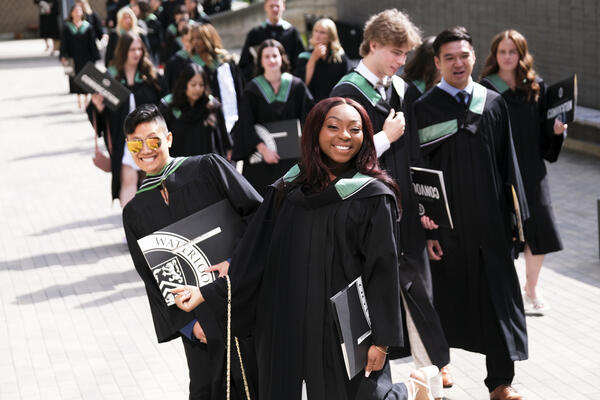
Waterloo scholars and students take action against gender-based violence
Researchers and students from the University of Waterloo are applying their scholarship and creativity to support actions to end gender-based violence

Researchers and students from the University of Waterloo are applying their scholarship and creativity to support actions to end gender-based violence
By Media RelationsResearchers and students from the University of Waterloo are applying their scholarship and creativity to support actions to end gender-based violence, and a number of these experts are available to speak with the media about their work related to this global issue.
Each year from November 25 to December 10, organizations and governments worldwide participate in 16 Days of Activism Against Gender Violence to remind all citizens that they can take actions in their everyday lives to stop gender violence. The campaign began today, on the International Day for the Elimination of Violence against Women, and concludes on Human Rights Day.
In Canada, the 16 Days campaign includes the National Day of Remembrance and Action on Violence Against Women, established to mark the anniversary of the Montreal Massacre on December 6, 1989.
A full schedule of events is planned for the University of Waterloo’s 16 Days campaign to engage students, faculty and staff. The campaign is led by the Women’s Studies program with university-wide partners, including the special advisor to the president on women’s and gender issues, the Status of Women & Equity Committee, and the HeForShe Impact 10x10x10 initiative.
“I hope that one day we can reach a point where campaigns such as this will become obsolete,” says Professor Rashmee Singh, a Waterloo scholar focused on domestic violence issues. “But until then, we need to continue to challenge complacency and notions that gender equity has been achieved. The prevalence of gender-based violence is one of the most significant indicators that this is not at all the case."
Contact Waterloo media relations to book the following professors who are available to speak about how their research takes action to eliminate gender violence:
Professor Jennifer Ball (Peace & Conflict Studies, Conrad Grebel University College) — Roles of women in community peacebuilding in Africa based on realities of the struggle for survival.
Professor Shannon Dea (Philosophy and Director of Women’s Studies, Faculty of Arts) — Violence against LGBTQ people, harm-reduction approaches to gendered issues, such as abortion and sex work.
Professor Marlene Epp (History and Peace & Conflict Studies, Conrad Grebel University College) — Gender-based violence and peacebuilding in contexts of global warfare, including refugee migration.
Professor Corey Johnson (Recreation and Leisure Studies, Faculty of Applied Health Sciences) — Power relations between dominant and non-dominant populations in leisure and higher education; LGBTQ contexts, gender and sexual relations in digital technology, reducing violence on campus.
Professor Naila Keleta-Mae (Drama and Speech Communication, Faculty of Arts) — Feminist and race studies to engage historically under-examined areas; gender and race in performance; feminism and celebrity culture.
Professor Veronica Kitchen (Political Science, Faculty of Arts) — Gender and global politics including gender-based violence against both men and women; military masculinity and PTSD.
Professor Patricia Marino (Philosophy, Faculty of Arts) — Sexual autonomy and sexual objectification; considerations of when sexual objectification is acceptable and when it is not.
Professor Carrie Mitchell (School of Planning, Faculty of Environment) — Infrastructure, urban planning, and gender: making cities safer for women and others.
Professor Sorouja Moll (Drama and Speech Communication, Faculty of Arts) — Critical analysis of how gender violence is normalized in all forms of media and communication systems.
Professor Aimée Morrison (English Language and Literature, Faculty of Arts) — Gendered violence online and in gaming; impact of trolling and threats of sexual violence and gendered policing of online social roles.
Professor Diana Parry (Recreation and Leisure Studies, Faculty of Applied Health Sciences) — 50 Shades of Grey phenomenon and violence in sexually explicit material consumed by women.
Professor Rashmee Singh (Sociology & Legal Studies, Faculty of Arts) — Governance and prosecution of violence against women, including use of visual evidence in domestic violence trials; impact of feminist activism on the criminal justice system.

Read more
From STEM enthusiasts to youth with passions for the environment, arts and health, Waterloo hosts more than 30,000 future leaders on campus every year

Read more
More than 7,200 new graduates crossed the stage and are set to embark on new adventures

Read more
Meet the 13 exceptional students representing Waterloo’s newest grads
The University of Waterloo acknowledges that much of our work takes place on the traditional territory of the Neutral, Anishinaabeg, and Haudenosaunee peoples. Our main campus is situated on the Haldimand Tract, the land granted to the Six Nations that includes six miles on each side of the Grand River. Our active work toward reconciliation takes place across our campuses through research, learning, teaching, and community building, and is co-ordinated within the Office of Indigenous Relations.